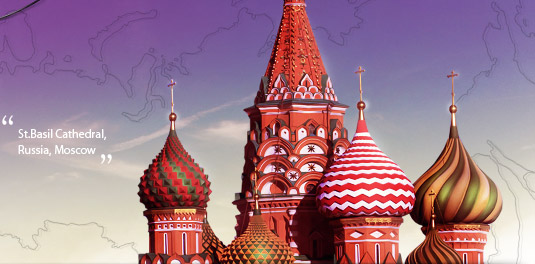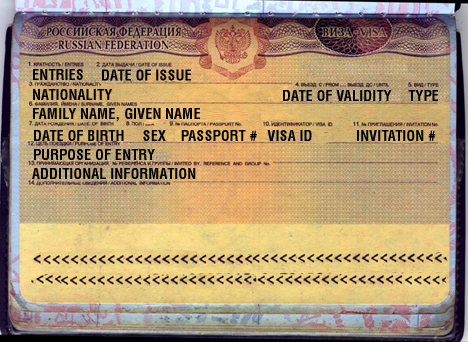Russian Visa
All foreigners (except citizens of some former Soviet republics) visiting Russia need a visa. In order to get one, travelers need an invitation from a Russian citizen or a company, which is then taken to a Russian embassy or consulate, where the actual visa is issued. Within three working days of arrival in Russia, the visa needs to be registered by the person/organization that issued the invitation. If you don't make it through this bureaucratic loop, you may have problems leaving the country.
Prices for processing Russian visas vary according to the applicant's citizenship and the embassy/consulate applied to. Perhaps in response to the trials the U.S. Embassy in Moscow puts Russian visa applicants through (see articles), U.S. citizens routinely pay more for Russian visas.
There are six types of Russian visas, but most travelers get one of three kinds:
Tourist visas are best for short visits. According to Russian law it is illegal for a hotel to provide you with an invitation if you are not going to stay there but this law is broken more often than it is followed. Many agencies can get you a visa and have it registered without a night booked in a hotel, and many hotels will give you give you an invitation and register it even if you're only staying with them for part of your trip.
Business visas aren't just for foreigners working in Russia. Far more flexible than tourist visas, they are often the best choice for tourists who are visiting friends and don't need a hotel, or who are looking to spend an extended period of time in Russia, especially those who want to travel independently or extensively. In order to get a business visa you need an invitation from a Russian firm, which can usually be arranged through a visa agency. You do not need to plan hotel reservations or an itinerary to get a business visa.
Student Visa
Student visas are a great deal; they're flexible, lengthy, and entitle you to Russian prices for trains, planes, the theater, and a host of other goodies. The only catch is that you have to prove enrollment at a Russian institution. If you are planning to enroll in a Russian university, the school authorities can probably help you arrange the visa.
Other Visa
Other types of visas include Transit Visas, On-the-Spot Visas, and Diplomatic Visas. Transit visas can be a cheap option for travelers headed for China or Central Asia, but it's often hard to make it in and out of the country in your allotted window of time. On-the-Spot Visas are dubious, not universally available, and very expensive. Diplomatic visas have a narrow range of applicability.
|
|
| A new style Russian visa. |
|
|
| An older style Russian visa. Though most Russian embassies have switched over to the new style visa, there are still some older visas in use. |
How to Get a Russian Visa
Although it is possible to arrange your own Russian visa, most travelers choose to hire a visa service to do the work. Invitations cost anything up to and beyond $30-$200, depending on the type of visa and the speed of service. For an extra $20-$30, agencies take your invitation to an embassy or consulate and send you the visa. Some services will even take care of registering the visa when you arrive in Russia. Given that each Russian consulate and embassy has different tastes and temperaments, it's usually best to have somebody who knows the ropes do the dirty work.
RUSSIAN VISA REQUIREMENTS FOR FOREIGN CITIZENS TO ENTER THE RUSSIAN FEDERATION
RUSSIAN TOURIST VISA
- Passport (must be valid 6 months beyond intended stay)
- Visa
- Tickets and Documents for return or onward travel
- Vaccinations - None Required
More information about Russian Tourist Visa Support
RUSSIAN BUSINESS VISA
- Passport (must be valid 6 months beyond intended stay)
- Visa
- Tickets and Documents for return or onward travel
- Vaccinations - None Required
More information about Russian Business Visa
EMPLOYMENT OR STUDY TRAVEL
Contact the nearest Russian Embassy or Consulate




